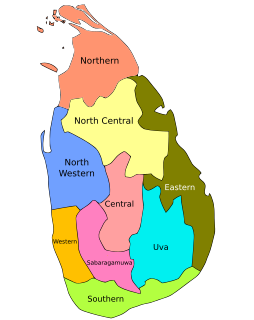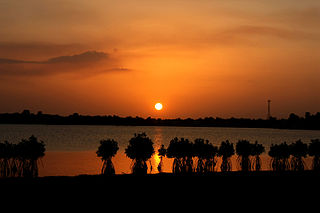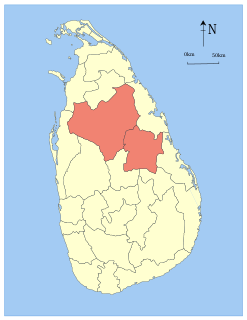
In Sri Lanka, provinces are the first level administrative division. They were first established by the British rulers of Ceylon in 1833. Over the next century most of the administrative functions were transferred to the districts, the second level administrative division. By the middle of the 20th century the provinces had become merely ceremonial. This changed in 1987 when, following several decades of increasing demand for a decentralization, the 13th Amendment to the 1978 Constitution of Sri Lanka established provincial councils. Currently there are nine provinces.

Islam is the third largest religion in Sri Lanka with about 9.7 percent of the total population. The main Muslim concentrations occur in Eastern Province. In other areas, such as in the cities of the western, north western and central Sri Lanka, Muslims form a segment of the non-rural population. The Muslims usually speak Tamil language in Sri Lanka.

The Eastern Province is one of the nine provinces of Sri Lanka, the first level administrative division of the country. The provinces have existed since the 19th century but did not have any legal status until 1987 when the 13th Amendment to the Constitution of Sri Lanka established provincial councils. Between 1988 and 2006 the province was temporarily merged with the Northern Province to form the North Eastern Province. The capital of the province is Trincomalee.

North Central Province is one of the nine provinces of Sri Lanka, the first level administrative division of the country. The provinces have existed since the 19th century but did not have any legal status until 1987 when the 13th Amendment to the Constitution of Sri Lanka established provincial councils. The province is the largest by size, and second least populated in the country. The province consists of the districts of Anuradhapura and Polonnaruwa, both of which were important ancient Sri Lankan kingdoms. The climate is semi-arid, and the forests are dry evergreen forests.

The North Eastern Province was one of the provinces of Sri Lanka. The province was created in September 1988 by merging the Northern and Eastern provinces. This merger was declared illegal by the Supreme Court of Sri Lanka in 2006. The province was formally demerged into the Northern and Eastern provinces on 1 January 2007. The capital of the province was Trincomalee.

The following is a list of schools in Sri Lanka.

The following outline is provided as an overview of and topical guide to Sri Lanka:
The 1978 Constitution of Sri Lanka provides for the election of members of Parliament from 22 multi-member electoral districts through the proportional representation electoral system.

The Central Province is one of the nine provinces of Sri Lanka, the first level administrative division of the country. The Central Province is primarily in the central mountainous terrain of Sri Lanka. It is the 6th largest province by area and is home to 2.5 million people. It is bordered by North Central Province to the north, Uva Province to the east, North Western Province to the west and Sabaragamuwa Province to the south and west. The province's capital is Kandy.

The Northern Province is one of the nine provinces of Sri Lanka, the first level administrative division of the country. The provinces have existed since the 19th century but did not have any legal status until 1987 when the 13th Amendment to the Constitution of Sri Lanka established provincial councils. Between 1988 and 2006 the province was temporarily merged with the Eastern Province to form the North Eastern Province. The capital of the province is Jaffna. The majority of the Sri Lankan Civil War was played out in this province.
Scientific research in Sri Lanka is carried out by several research institutions, however, historically Sri Lanka has been behind regional peers in research funding. Sri Lanka was ranked 95th in the Global Innovation Index in 2021

The 2004 Sri Lankan provincial council election was held on 24 April 2004 and 10 July 2004 to elect members to seven provincial councils in Sri Lanka. No election was held in the eighth province, North Eastern, which had been governed directly by the national government since March 1990. The United People's Freedom Alliance, which was in power nationally, won all seven provinces.

Northern Provincial Council is the provincial council for the Northern Province in Sri Lanka. In accordance with the Sri Lankan constitution, NPC has legislative power over a variety of matters including agriculture, education, health, housing, local government, planning, road transport and social services. The constitution also gives it powers over police and land but successive central governments have refused to devolve these powers to the provinces. NPC has 38 members elected using the open list proportional representation system.

Provincial council elections were held in Sri Lanka on 8 September 2012 to elect 114 members to three of the nine provincial councils in the country. 3.3 million Sri Lankans were eligible to vote in the election. Elections for the Northern Provincial Council, which had been governed directly by the national government since it was demerged from the North Eastern Provincial Council in January 2007, are overdue but the government has not set a date. Elections to the remaining five provincial councils are not due till 2014 as they had their last election in 2009.

Provincial council elections were held in Sri Lanka on 21 September 2013 to elect 148 members to three of the nine provincial councils in the country. 4.4 million Sri Lankans were eligible to vote in the election. Elections to the remaining six provincial councils were not due as they had their last election in 2009 or 2012. This was the first provincial council election in the Northern Province in 25 years.
Provincial governments of Sri Lanka are the devolved governments of the nine Provinces of Sri Lanka. In accordance with the Sri Lankan constitution, provinces have legislative power over a variety of matters including agriculture, education, health, housing, local government, planning, road transport and social services. The constitution also gives them powers over police and land but successive central governments have refused to devolve these powers to the provinces.
The Government of the Northern Province refers to the provincial government of the Northern Province of Sri Lanka. Under the Sri Lankan constitution the nine provincial governments of the country have power over a variety of matters including agriculture, education, health, housing, local government, planning, road transport and social services. The constitution also gives them powers over police and land but successive central governments have refused to devolve these powers to the provinces. Legislative power rests with the Northern Provincial Council whilst executive power rests with the Governor and Board of Ministers.
The following lists events that happened during 1992 in Sri Lanka.
The following lists events that happened during 1999 in Sri Lanka.

COVID-19 vaccination in Sri Lanka is an ongoing immunisation campaign against severe acute respiratory syndrome coronavirus 2 (SARS-CoV-2), the virus that causes COVID-19, in response to the ongoing pandemic in the country. As of late July, the Sinopharm BIBP vaccine accounted for 78% of the total 13.8 million vaccines obtained by Sri Lanka to date. The United States donated over 1.5 million Moderna vaccine through COVAX.












